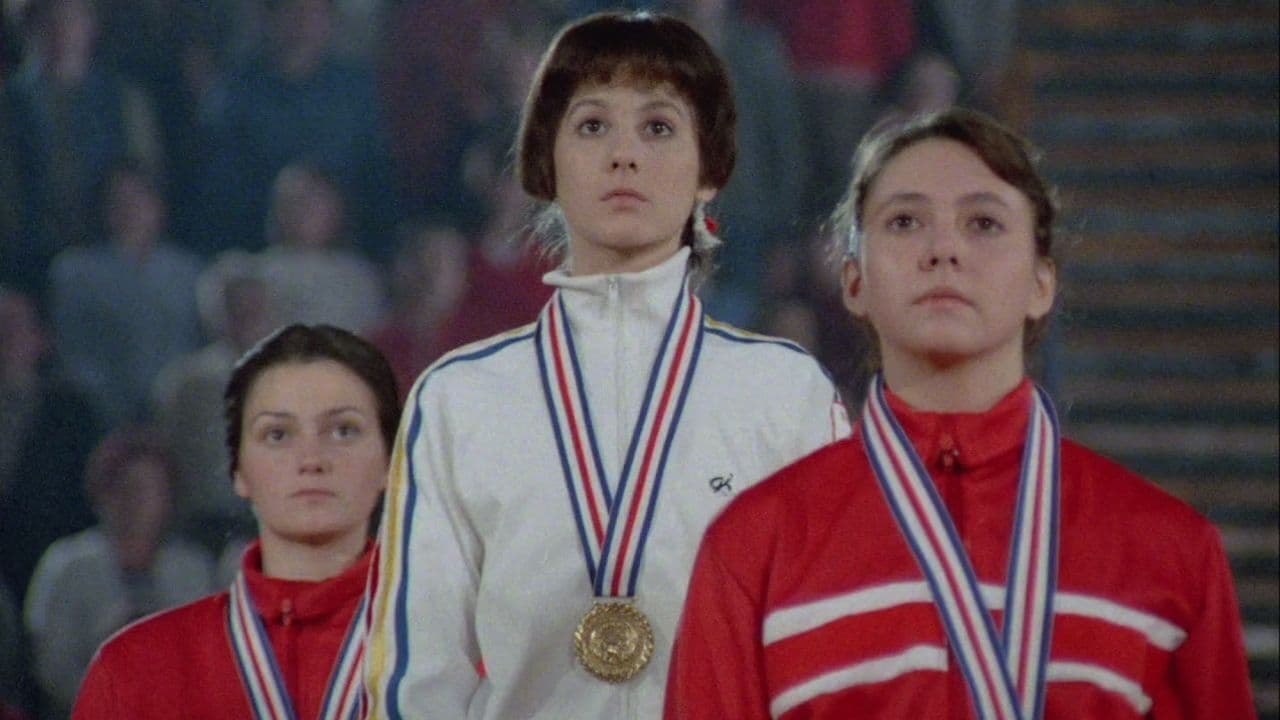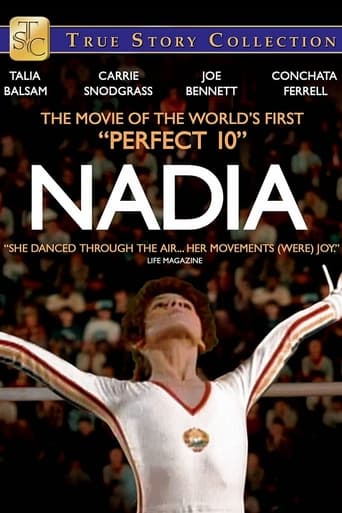

What a waste of my time!!!
... View MoreThe greatest movie ever made..!
... View MoreWhat a freaking movie. So many twists and turns. Absolutely intense from start to finish.
... View MoreThe best films of this genre always show a path and provide a takeaway for being a better person.
... View MoreThis is the only American biopic I know of about an Eastern Bloc sportswoman. During the seventies and eighties women's gymnastics had a higher profile than it does today- indeed, it was one of the few sports whose female participants were better-known than the male ones. This was largely due to the achievements of three remarkable young women at three consecutive Olympiads. The star of Mexico City in 1968 was the Czech Vera Caslavska whose popularity in the West was partly due to her striking platinum-blonde looks and partly to the fact that she was an outspoken supporter of her country's dissident movement at a time when the "Prague Spring" had recently been crushed by Warsaw Pact troops.The heroine of Munich in 1972 was Olga Korbut, the girl who put the "artistic" back in "artistic gymnastics", showing that her precise, disciplined sport could also be a vehicle for personal expression. Olga's vibrant, lovable personality won so many hearts that it is often forgotten that she was not the Olympic all-around champion in 1972. (That honour went to her team-mate Ludmilla Tourischeva, a precise, disciplined gymnast of the classical Soviet school). Unlike Caslavska, Korbut was not an outspoken dissident, but in the West she was widely seen as a youthful free spirit at odds with the grey conformism of Brezhnev's regime.And then in 1976 at Montreal there was the Rumanian Nadia Comaneci, the first gymnast ever to score a "perfect ten", even though she was only fourteen at the time. (The scoreboard, unable to cope with more than three digits, recorded her score as "1.00" rather than "10.00"). Although in her gymnastic style and her reserved personality Nadia was closer to Tourischeva than to Korbut, "Little Miss Perfect" became a media sensation overnight. Her popularity increased when, now a beautiful young woman, she won two further gold medals at the 1980 Moscow Olympics, although she lost her all-around title to Elena Davydova, allegedly because of biased scoring by Soviet judges.Nadia did not take part in the Los Angeles Olympics in 1984 although she was only 22, not old even by gymnastic standards. (Caslavska had been 28 in 1968). She had been forced into retirement by Rumania's Ceausescu dictatorship, which at the height of her fame had milked her victories for all they were worth but which became deeply suspicious of her after her coaches, Béla and Márta Károlyi, defected to the West in 1981. Terrified that his country's most famous citizen might follow suit, Ceausescu banned her from travelling abroad. This suspicion was, of course, well-founded. Nadia had no more love for the Communist system than Caslavska, and did indeed defect in 1989, shortly before the regime's overthrow.This film might have been better had it been made after 1989, when Nadia's full story was known. As things were, it came out in 1984, and relies heavily on the account given by the Károlyis, who acted as consultants to the film-makers, although it largely avoids political controversy. The Károlyis' many clashes with authority are ascribed to one self-important official in the Rumanian Sport Federation rather than to the Communist system itself. Predictably, Béla becomes the film's hero, a handsome, charismatic figure, a strict disciplinarian when need be but generally a loving father-figure to his girls.The early part of the film is not bad, largely because Leslie Weiner, the adorable child-actress playing the young Nadia, is excellent. There is one enchanting scene when Nadia first meets her future great friend and team-mate Teodora Ungureanu and the two spontaneously go into a sort of dance. This part of the film was evidently shot in autumn and there are some attractive views of the misty Yugoslavian countryside, here standing in for Rumania.The film's narrative structure is based around the rise, fall and rise again of a great champion; the climax comes with the 1979 World Championships when Nadia, despite nursing an injured wrist, registers a near-perfect score to help her team to a gold medal. Rather oddly, the 1980 Olympics are omitted altogether, possibly out of a wish to avoid the controversy surrounding the judging. The problem comes with the "fall" part of the story. Nadia is shown attempting suicide, quarrelling bitterly with Teodora and putting on weight due to overeating. The trouble is that all these incidents are either fictitious or based upon misunderstandings; Nadia did indeed put on weight during her mid-teens, but this was due not to gluttony but to the fact that she was growing much faster than most girls of her age. She grew seven inches in height between the ages of fourteen and sixteen; it would have been far more worrying if she had shot up like this without a corresponding increase in weight. It is no wonder that when Nadia eventually saw the film she hated it.Things are not helped by the casting of the wooden Johann Carlo as the older Nadia. (Despite that masculine-looking forename, Carlo is female). She bears little resemblance to Nadia and at 27 was far too old to portray her between the ages of 14 and 17. This film is largely forgotten today; I was only aware of it because I came across an old video in a charity shop and bought it because of my interest in gymnastics. Nadia deserved better than this. 4/10 Some goofs. We see a Rumanian flag the wrong way round, with the red stripe rather than the blue closest to the flagpole. It's a pity the producers didn't ask Károlyi to advise them on pronunciation as well as gymnastics, because we hear various pronunciations of his surname, but never the correct one. (KAH-ro-yee, with the "l" silent). And "Comaneci" is pronounced "common-etch", not "common-each".
... View MoreI have never actually seen the movie but by reading the summary already makes me believe there is fake contents.By stating it tells about her "suicide attempt" I assume they mean when she consumed soap/bleach.It gives you a wrong idea of Nadia's life.The "suicide attempt" was fake. It never happened. She did consume soap of some sort but it was by TOTAL accident. She was frustrated with constant supervision from coaches. And she was not paying total attention. She had drinking water in a cup next to the cup of soap or bleach.Any person has made a mistake of drinking from the wrong cup when two cups are next to each other. Especially if you are not paying attention.Nadia Comaneci is by far one of THE BEST gymnasts of all time. she did get the first perfect ten. Anyone who has enough lack of respect for her to believe ridiculous tabloid stories should not spend time talking about her or reading about her or making a movie about her life. I do not mean to offend this movie or its creators but Nadia Comaneci deserves much more respect than that. Anyone who has been a gymnast, is a gymnast,has ever been associated with gymnastics, or even read Nadia's autobiography would say the same.Since I have never actually seen the movie though, my assumption of the suicide attempt they talk about could be wrong. Even though Nadia never did attempt suicide(unless you consider gymnastics a suicide attempt)
... View MoreFilmed just after Nadia dropped out of international spotlight and defected to the United States, this movie is a real classic for gymnastics fans. It is extremely difficult to find but occasionally turns up on television or eBay.The film follows Nadia from childhood through the 1980 Olympics, and along the way chronicles her battles with her coaches, depression, suicide, and the lack of a "normal" childhood. There is also some perspective on the changes taking place in the Romanian government, and of course some wonderful gymnastics routines. Highlights include actual footage of Nadia at the Montreal Olympics (when she got the first perfect 10) and also great performances by Marcia Frederick.
... View MoreI really enjoyed the movie Nadia. I am 13 years old and have always wanted to be a gymnast. The movie Nadia really showed how hard and how much effort you had to put into gymnastics, and also how Nadia got to the top. It was a very informative and interesting movie
... View More